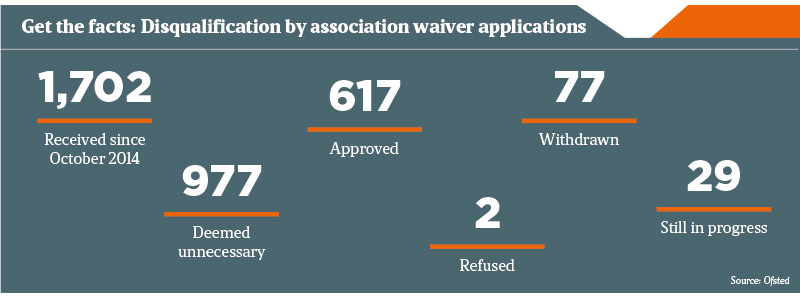More than 1,700 teachers and childcare providers were left in limbo as a result of “disproportionate” rules that disqualified them from working because they lived with someone with a criminal record.
Over the past two years, Ofsted received hundreds of unnecessary applications for waivers to continue at work after confusing teachers with so-called “disqualification by association” rules.
Introduced in 2014, the rules required anyone working with young children had to apply to Ofsted if they lived with anyone who had a spent conviction.
We know significant numbers of people have been unnecessarily suspended and some have lost their jobs as a result
New figures obtained by Schools Week show that 1,702 applications for waivers were submitted but only two were refused.
In total, 977 – more than half – were deemed unnecessary as the nature of the offence, or the role held by the applicant, meant a waiver wasn’t needed.
On Monday the government announced that as of September the rules will no longer apply to schools. They will remain in effect for childminders, a group the law was originally intended to cover.
The announcement was welcomed by Unlock, a charity representing people with criminal convictions.
“We’ve been calling for it to be scrapped for nearly four years because it did nothing to contribute towards safeguarding in schools. The arrangements were disproportionate, unfair and ineffective.
“Yet the fallout should not be underestimated – we know significant numbers of people have been unnecessarily suspended and some have lost their jobs as a result,” said the charity.
The rules caused distress as teachers, support staff and even headteachers who had done nothing wrong themselves were suspended from work and forced to wait for permission to return.
Confusion was particularly widespread because the list of crimes sparking a potential disqualification was long, but not considered to be exhaustive. Consequently many school leaders felt it important to err on the side of caution.
The government issued new guidance in early 2015, clarifying that only those working in an after-hours capacity could be barred from working.
The majority of applications (1,241) were made in the early days, but 459 have been made since January 2016.
In total, two applications were refused, 617 were granted and 77 were withdrawn. The rest were deemed unnecessary.

Exempting schools from the rules was first mooted in a 2016 Department for Education consultation, following widespread criticism of the process. But the change has only just been instituted more than two years later.
The DfE said it was clear from the consultation responses “that there is a significant consensus that the current arrangements are widely considered unfair and that they represent a disproportionate response to the risk to children”.
Unison, which represents large numbers of early years staff, has urged schools to destroy any data they have collected on staff.
“They resulted in thousands of early years staff being needlessly suspended from work and added nothing to child protection measures,” said national education officer Ben Thomas.
He said schools should get rid of the information as a matter of urgency.









First off, I completely agree that these rules were always confusing and had the potential to be applied haphazardly and without the important concept of common sense.
Yet once again only one side of the discussion is presented.
We have a quote from an organisation which represents people with criminal convictions. No need to guess what direction they come from.
We have a quote from a union that represents staff who were affected by these rules (some of which would undoubtedly have been unreasonably treated), whose purpose is furthering its members’ interests.
In all this rush to find a stick to beat the Government not a moment has been taken to consider why the rules were brought in in the first place, or to hear from someone representing the interests of children and whose purpose is to try and reduce the likelihood of child abuse.
When these rules were first brought in, and I couldn’t really understand why, someone explained to me that child abusers (as an example) try to find ways to be near children. Years ago, when checks weren’t as strict as they are now, they would try and get jobs involving children and an obvious area was schools – as teachers or something else (one only needs to remember Ian Huntley). Thankfully now the chances of such people being able to work in schools is much reduced, so I was told that as a result they ‘latch on’ to people who work with children. Using a rough example, there is more chance of coming into contact with children if I live with a primary school teacher rather than an accountant.
I’m not defending the specific disqualification by association rules that were brought in, but it should be remembered that they weren’t brought into being in order to beat teachers over the head. They were brought in to try and reduce child abuse.